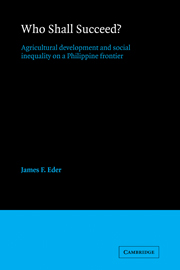Book contents
- Frontmatter
- Contents
- List of tables, figures, and maps
- Preface
- 1 Introduction
- 2 Rich man, poor man: life in a frontier farming community
- 3 The economic and social origins of the migrant farmers
- 4 Eight migrants
- 5 The origins of social inequality
- 6 The maintenance of social inequality: earning a living
- 7 The maintenance of social inequality: earning prestige
- 8 The perpetuation of social inequality?
- 9 Conclusion
- Appendixes
- Notes
- Bibliography
- Index
- Frontmatter
- Contents
- List of tables, figures, and maps
- Preface
- 1 Introduction
- 2 Rich man, poor man: life in a frontier farming community
- 3 The economic and social origins of the migrant farmers
- 4 Eight migrants
- 5 The origins of social inequality
- 6 The maintenance of social inequality: earning a living
- 7 The maintenance of social inequality: earning prestige
- 8 The perpetuation of social inequality?
- 9 Conclusion
- Appendixes
- Notes
- Bibliography
- Index
Summary
At the heart of this case study of the process whereby a group of migrant farmers, once equal, came to differentiate themselves socially, lies one of the most vexing questions in all of social science: to what extent are useful generalizations about the causes of human behavior possible. With this question setting the underlying theme, I want to return, in my concluding chapter, to the two explanatory interests I announced in my first: the circumstances surrounding the origins of social inequality, and the circumstances under which social inequality is maintained. With respect to San Jose itself, of course, we have already examined these interests in some detail. Now I want to take a broader view. Setting my own work in the context of related studies, I will reframe and pursue my two interests, the emergence and institutionalization of social inequality, in a more comparative perspective. Seen in this perspective, both neoclassical and Marxist models of behavior and development, I will argue, are hopelessly simplistic in their failure to attend to the obvious complexity of the competence and motivation of human beings, in all their individuality.
My point of departure is the question of developmental change. For social inequality is not something that is merely present or absent in a community, but something that changes and develops over time and is hence variable in nature and intensity. True, for purposes of analysis, communities are often frozen at particular points in time and, as an artifact of that analysis, made to appear as if the subject of interest – social inequality or economic development – is either present or absent.
- Type
- Chapter
- Information
- Who Shall Succeed?Agricultural Development and Social Inequality on a Philippine Frontier, pp. 178 - 207Publisher: Cambridge University PressPrint publication year: 1982



